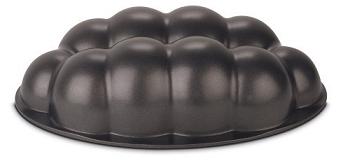Crème anglaise is a very rich custard that is often used as a sauce with other desserts. It is sometimes described as a “pouring custard” because it is thin enough to be poured and is not, unlike some pudding-like custards, thick enough to be scooped for serving. The custard sauce is made with cream and egg yolks, lightly sweetened with sugar and lightly flavored with vanilla. If you’ve never had it before, it is somewhat similar to the taste and texture of melted vanilla ice cream, but maybe a bit less sweet. It goes very well with cakes, souffles and all kinds of fruit desserts, from tarts to a simple bowl of strawberries. I often make it to go with angel food cake, as it is a great use for all those extra egg yolks.Crème anglaise is made by heating cream with a vanilla bean until the mixture just comes to a simmer. Several egg yolks are then tempered with the hot cream mixture, which is added very slowly so it does not cook the eggs. The sauce base is then returned to the stove and cooked just until it is thick enough to coat the back of a spoon. It can then either be served hot or stored in the fridge until you’re ready for it. You can find a recipe for crème anglaise here.
The two most common problems with crème anglaise are (1) adding the cream to the egg yolks too quickly and (2) overcooking the custard. In both cases you end up with a “broken” sauce that is not smooth and has a relatively eggy flavor. The best thing to keep in mind is that, for all its richness, the sauce is a very delicate one and it is best to take it very slowly. It’s always better to take a few extra minutes than to have to throw out the whole batch and start again.





Big Sky Chef
May 12, 2009I thin down my Pastry Cream with whole milk to desired consistency for a quick Anglaise.
Anonymous
May 13, 2009I love these little informative posts that you do. I’ve always wondered what the difference between creme angliase and custard was, but never bothered to look it up.
Thanks a lot, Nicole.
Avanika (Yumsilicious Bakes)
May 13, 2009Sorry, I forgot to leave my name. 😛
BreadintheBone
May 13, 2009Over here in England, this is just called custard. The other stuff is baked custard (or creme brulee, usually. Or custard tarts.)
It’s best poured over hot desserts, which the English just call puddings. Don’t confuse these with American pudding – that barely exists over here. However, if you make a plum or rhubarb or apple crumble, this kind of custard is what you should pour over it, hot. Absolutely delicious.
Don’t serve it cold, or people will complain that it’s ‘manky’. That means gluey and disgusting.
Jim Hodges
May 13, 2009This post is very helpful to me because I am new to cooking and baking. There are really a lot of things to learn in the world of culinary. However, it is brilliant!
Jen
May 14, 2009Creme anglaise is the base to one of my favorite desserts from childhood – floating island. Basically nothing more than the creme with a meringue topping, eaten cold. Despite what BreadintheBone says, there’s not much better to me than a big dish of floating island!
Rachel
May 14, 2009This is the traditional filling for elcairs and cream puffs isn’t it? I’ve heard that you take this and its “thickened with starch” does that mean you just mix in a slurry of flour while heating just like making a gravy? sorry to change the subject but I’ve been wondering.
harcoutbreton
May 28, 2009every time i make sauce its either too creamy or watery… i wonder how could i fix it… anyways this looks good… definitely going to try this… thanks for sharing…
indian curry recipe
August 26, 2009Crème anglaise ? the first time i learn about this and thanks for sharing such valuable information!
chinese food recipes
August 26, 2009Your site provide alot of information that very useful for a cooking beginner like me 🙂 thanks for the info.